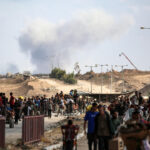In the heart of Harare, Zimbabwe’s capital, a silent but thriving underground economy unfolds daily on crowded street corners and bustling pavements. Here, people like Leonard Mumba, a 43-year-old wheelchair user, trade in hard currency not by choice, but by circumstance. Once a humble airtime vendor at the city’s Copacabana bus terminus, Mumba now serves as a proxy dealer in the nation’s black market for foreign exchange, a trade driven by the scarcity of Zimbabwe’s new local currency, the ZiG (Zimbabwe Gold).
For millions of Zimbabweans, navigating an economy marked by chronic cash shortages, inflation, and complex financial regulations has become a survival skill. The government’s drive toward a “cashless society” and its decision to limit the circulation of ZiG notes have created an economy where U.S. dollars dominate everyday transactions, while local currency remains the only acceptable tender in government institutions. This mismatch has fueled the rise of an intricate black-market system one that increasingly relies on the country’s most marginalized citizens.
When Kenias Mutsenha, a 46-year-old consultant, recently needed to reactivate his dormant local currency bank account, he was told he had to pay a reactivation fee in ZiG notes. The problem: he had only U.S. dollars, which the bank refused to accept or exchange. His only option was the informal street market. “I had to find cash somewhere,” Mutsenha recalled. “The only place was the streets.”
In Harare’s Central Business District (CBD), where black-market currency exchange thrives despite repeated government crackdowns, Mutsenha eventually found Mumba — one of dozens of disabled people now fronting for underground dealers. From his wheelchair, Mumba conducts quick, discreet transactions under the watchful eyes of suppliers and wary police officers.
Observers say this shift is no accident. Following the government’s crackdown on illegal money changers after the introduction of ZiG in 2024, black-market suppliers began recruiting people with disabilities, knowing that law enforcement would be less likely to target or arrest them.
“Due to my condition, police would not easily suspect me, especially in the beginning,” Mumba told reporters. “They are lenient on arrest due to our circumstances.”
Human rights advocate Thabiso Moyo explained that the police’s leniency stems partly from logistics — most police stations are not disability-accessible, making arrests cumbersome. “This has created a loophole that allows real black-market players to hide behind disabled traders,” Moyo said. “The disabled become human shields in a broader system of survival and exploitation.”
Disability activist Plaxedes Choto estimates that more than three dozen people with disabilities are now active in Harare’s CBD alone, many working on commission for powerful money suppliers. “They are exploited but also economically trapped,” she said.
In Zimbabwe, the currency crisis has deepened economic inequality, pushing people with disabilities further into informal and risky livelihoods. The National Disability Policy launched in 2021 promised inclusive employment, yet four years later, progress remains limited. Many disabled citizens survive through vending, begging, or increasingly currency trading.
The challenges are immense. Beyond unemployment, people with disabilities face a high cost of living, needing specialized diets, assistive equipment, and transportation support. Monthly government welfare grants barely cover basic needs. “Our infrastructure was built without the disabled in mind,” said Samantha Sibanda, director of the Signs of Hope Trust, an organization advocating for disability rights. “Without access to formal education and jobs, most are forced into street trading or begging.”
For Mumba and others like him, the black market offers both income and insecurity. Transactions are secretive, often involving silent exchanges where money is slipped into bags or placed under wheelchairs. “A man came from across the road, dropped a black satchel, and hooked it to the wheelchair. They didn’t speak,” Mutsenha recounted of his encounter.
Despite operating outside the law, disabled currency traders rarely report being robbed. Instead, they face harassment from police officers demanding bribes to allow them to continue working. “It’s dangerous, but it pays better than selling airtime,” Mumba admitted. “Everyone wants cash, either USD or ZiG.”
The broader crisis stems from Zimbabwe’s dual-currency dilemma. Although the government insists the ZiG is stable, celebrating a year of steady exchange rates in June on the ground, U.S. dollars remain king. Banks lack physical ZiG notes, and converting between currencies through official channels requires extensive paperwork and often Central Bank approval, which locals describe as “near impossible.”
The Reserve Bank of Zimbabwe (RBZ) maintains that the currency is stable and that the difference between official and street exchange rates has dropped below 20%. But economists and traders say this overlooks the daily struggles of citizens who cannot access local currency for simple transactions.
For people like Clever Gorejena, another wheelchair user turned currency trader, the situation is a reflection of desperation, not defiance. “I deal in both hard currency and online transfers,” he said. “I didn’t choose this. It’s just survival.”
Even some government workers and businesspeople are turning to the black market to convert local currency payments into U.S. dollars. A black-market supplier told reporters that high-profile individuals routinely use disabled traders as intermediaries to avoid detection. “The big shots get paid in ZiG but want USD,” he said. “We help them find it and our guys on the ground make it happen.”
The Harare City Council acknowledges the presence of disabled black-market traders but says its focus remains on “unlicensed shops and illegal structures.” Still, the council’s spokesperson, Stanley Gama, admitted that anyone operating in the streets without formal regulation is breaking the law, regardless of circumstance.
Ultimately, the combination of bureaucratic red tape, inflation, and systemic exclusion has created a vicious cycle: citizens can’t access legal cash, banks can’t supply it, and the disabled have become the unwitting face of an underground trade that props up the national economy.
“We are living in tough times,” Sibanda lamented. “People with disabilities are being used again not for pity, but profit.”
For Mumba, the uncertainty weighs heavy. “No one knows about tomorrow,” he said, his eyes scanning the street where he spends most of his days. “Robbers can target me, or the police can come. But the worst thing is, I know this job is illegal and doesn’t help build my country’s economy. I just want a real chance something better than this.”
In Zimbabwe’s fragile economy, that chance remains elusive as survival continues to depend on the flickering fortunes of a currency few can trust and a system that leaves the most vulnerable carrying its risks.













Leave a comment